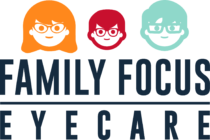Having to deal with glasses or contact lenses all day can be exhausting for people with myopia. And while laser eye surgery could be effective, it’s not for everyone. What’s more, children’s eyes are still growing, so myopia control needs to go beyond simply correcting vision. Surely there must be another option.
And there is! There’s a non-surgical choice available that might be perfect for you: orthokeratology!
Orthokeratology, or ortho-k, is a treatment for myopia or nearsightedness that involves wearing special contact lenses to correct your vision while you sleep.
What Is Myopia?
In recent years, a lot has been said about myopia, also known as nearsightedness. It’s a growing concern. Currently, nearly 30% of Americans are myopic, and it’s predicted that 50% of the world’s population will have some level of myopia by 2050.
Experts aren’t entirely sure what causes myopia, but it appears to be a combination between genetics and environmental factors. For example, if your parents have myopia, it’s more likely you will too. It’s also possible excessive screen time and not getting enough time outside may increase your child’s risk of developing myopia.
What we do know is myopia occurs thanks to an elongated eyeball. Normally, light enters the eye through the clear front cover called the cornea before passing through the lens. These 2 structures focus light onto the photoreactive cells at the back of the eye called the retina.
However, for people with myopia, the eye is too long, or the cornea is too curved. This causes the light to land in front of the retina, creating a blurred image.
Myopia Symptoms
The most obvious and well-known symptom of myopia is blurry vision of distant objects, while close objects remain clear. But it can cause other signs, too, including headaches and eyestrain.
Since myopia typically first develops in children, testing for it is integral to early eye exams. It can be challenging to notice the first signs of myopia. Your kid may not have the language to explain what’s going on. They could also simply assume this is how everyone sees the world. They’ve only ever had their own eyes, after all.
All vision problems, not just myopia, can translate to needing help in school. Keep a watch for some of these signs that your child may have myopia:
- Complaints of headaches or eye discomfort
- Lack of focus, especially when it involves looking at distant objects
- Eye rubbing or frequent blinking
- Covering one eye or tilting the head to the side
Myopia is progressive, so if diagnosed early, we can start working to slow it down. This is vital for a child’s eye health throughout their entire life. Myopia typically stabilizes around 20, but high levels of myopia could increase the risk of eye diseases, such as:
- Cataracts
- Glaucoma
- Macular degeneration
How Does Ortho-K Help Myopia?
Orthokeratology, also known as ortho-k, is simple when you think about it. While a lot of science and expertise works behind the scenes, ortho-k lenses address the most apparent cause of myopia: the irregular cornea.
Ortho-k lenses apply gentle pressure on the cornea overnight to carefully reshape it. By doing so, the cornea can focus light correctly on the retina, resulting in clear vision. All while you’re sound asleep.
The effects of ortho-k lenses typically last for a day, meaning they must be worn every night to maintain the correct corneal shape. It’s a terrific ally for adults or kids with mild to moderate myopia looking to take a break from glasses or traditional contact lenses.
Ortho-K & Myopia Control
It’s pretty cool that ortho-k lenses can give your child clear vision throughout the day. But it doesn’t end there—they can help control myopia progression too!
Myopia typically progresses rapidly in children, especially during their school years. However, Ortho-K lenses can slow myopia progression in children by cueing the eye to stop growing.
As a result, your child’s prescription might only minimally change while they wear these lenses. Some studies have shown ortho-k lenses can reduce myopia progression by up to 56% compared to eyeglasses. That means less myopia now and less chance of eye diseases caused by high myopia.
Benefits of Ortho-K
Ortho-k doesn’t require any cutting or removal of corneal tissue. Thus, there’s little risk of permanent damage to the eye. And, if you ever discontinue Ortho-K, your eyes should return to their original shape.
Wearing contact lenses while sleeping might sound uncomfortable, but most people don’t experience discomfort with ortho-k lenses after wearing them for a while. The lenses are typically made from gas-permeable material, which allows oxygen to reach the cornea.
Ortho-K is an excellent alternative to traditional vision correction methods, particularly for those who lead an active lifestyle or work in environments where wearing glasses or contacts is inconvenient.
Additionally, it can be a better option for children who wear glasses to school or for outdoor activities. They no longer have to worry about losing or breaking their glasses and can engage in sports without vision impairment.
Is Ortho-K Right for My Child?
Myopia is a common eye problem in children that can lead to further eye complications, but ortho-k offers a fantastic potential solution. Ortho-K lenses can control the progression of myopia, preventing further deterioration of a child’s vision, and encourage an active life without worrying about glasses.
Family Focus Eyecare offers ortho-k as part of myopia control programs. Your child’s vision is precious, so if you want to know how ortho-k can help protect your kid’s eye health for years to come, book an appointment today!



